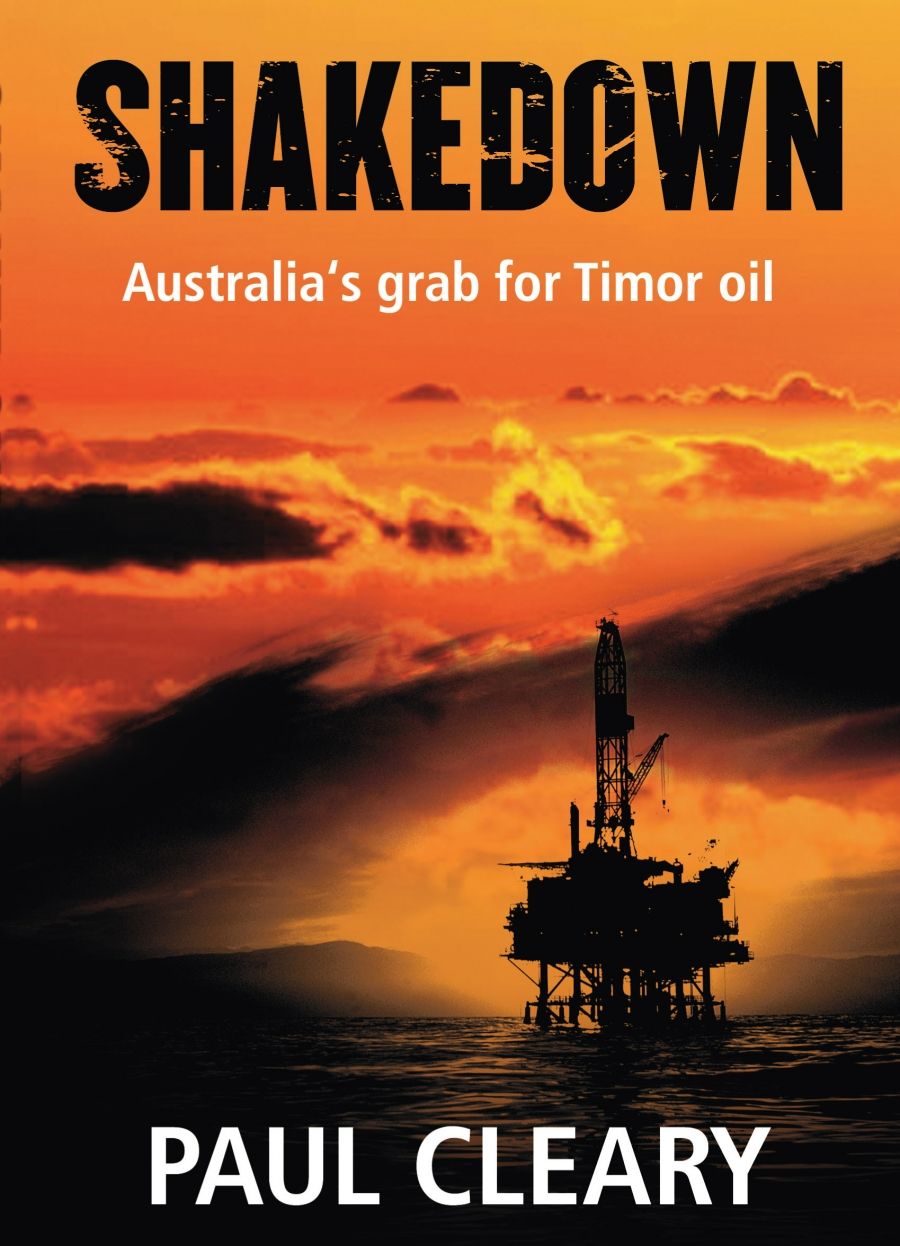
- Free Article: No
- Contents Category: Non-fiction
- Review Article: Yes
- Online Only: No
- Custom Highlight Text:
East Timor’s former Prime Minister Mari Alkatiri has a knack of hiring international advisers who win access to his inner circle then publish tell-all books on leaving his employ. First there was Lynne Minion, whose Hello Missus: A Girl’s Own Guide to Foreign Affairs (2004) lampooned him mercilessly and sold like hot cakes. Now Paul Cleary follows the pattern, but in a more respectable book, worthy of serious attention.
- Book 1 Title: Shakedown
- Book 1 Subtitle: Australia's grab for Timor oil
- Book 1 Biblio: Allen & Unwin, $29.95pb, 304pp
- Book 1 Cover Small (400 x 600):

- Book 1 Cover (800 x 1200):

Cleary has documented the story well, abstracting the history of the oil side of Australian diplomacy in this case. He tracks pre-invasion cables written by Australian Ambassador Richard Woolcott, who urged policy strategists not to be soft, but to keep eyes fixed on the hydrocarbon resource bonanza that Portuguese Timor offered. Woolcott’s most-cited cable was written to Canberra in August 1975, days after an Indonesian-instigated civil war had erupted in Timor. He wrote: ‘I wonder whether the Department has ascertained the interest of the Minister or the Department of Minerals and Energy in the Timor situation. It would seem to me that this Department might well have an interest in closing the present gap in the agreed seabed and that this could be much more readily negotiated with Indonesia ...’ It ended thus: ‘I know I am recommending a pragmatic rather than a principled stand but that is what national interest and foreign policy is all about.’
Cleary’s insider account is written with flair, capturing the flavour of events. Describing Australian attitudes to Timor, he notes that it ‘provided foreign policy advisers ... with one of those once-in-a-career moments’ of choosing between principle and ‘a national-interest decision that could eliminate a potential nuisance while possibly enriching Australia. It was the very stuff of modern diplomacy.’ The reader can almost feel the frisson in the Jakarta embassy.
After the Whitlam government was dismissed, Malcolm Fraser adopted its policy, despite initial resistance to the Woolcott approach. De facto recognition of Indonesian sovereignty in East Timor followed in January 1978. The first Australian-Indonesian negotiation on the seabed boundary began soon after.
Those arriving in Dili with an idealistic mission, as Paul Cleary did, often discover that Timorese reality collides with preconceptions. The writer changed his ideas on certain issues after this book was commissioned, and it has turned into a different work. He saw things within Alkatiri’s Fretilin government that conditioned his David and Goliath view of the oil question and his denunciations became twofold: of Australian perfidy, and of the abuses he saw inside the Timorese government.
Cleary devotes a special chapter, ‘Animal Farm’, to corrupt government dealings and to rights abuses which came to his attention. He describes the Fretilin government’s growing authoritarian tendencies, the negative effects of imposing Portuguese as an official language, and two cases of violence against Dili residents involving ministers. The first was the 2003 case of Malaysian businessman Wong Kee Jin, involving Alkatiri himself, whose bodyguards attacked Wong in his presence. The second involved nowimprisoned Interior Minister Rogerio Lobato, who used a rifle butt to fracture the skull of a motorist who overtook him in a city street.
That Cleary tells these tales is a tribute to his honesty, but the chapter sits awkwardly, signalling his divided loyalties. He admires Mr Alkatiri for his evident qualities particularly his pluck in standing up to Australian negotiators determined to shake down the Timorese share of hydrocarbon royalties, which he details in Chapter 13. Understandably he does not want his reservations to detract from the central theme, but he can hardly keep them separate.
As he observes members of the former Alkatiri government have been named in an anti-racketeering lawsuit underway in America against the ConocoPhillips company, where it is alleged that, with Australian government connivance, the company paid Timorese politicians millions of dollars in bribes to secure its contracts in the Timor Sea, including US$2.5 million to the former prime minister. Both Mr Alkatiri (who is not a defendant) and ConocoPhillips have vehemently denied the allegations, but in 2006 United States Judge Emmel Sullivan dismissed the company’s objections and ruled that there is a case to answer.
Whether or not these allegations are proven. Cleary, in the chapter called ‘Animal Farm’, makes independent observations about corruption within the Alkatiri government. Although they do not diminish the sense of Australian iniquity, it is fair to question the point of backing Timorese politicians’ claims to these resources if the leaders are lining their own pockets and the benefit will not flow to the populace. It is to Cleary’s credit that he addresses such issues in an important work of historical register, but the contradiction nags at the heart of the book.


Comments powered by CComment